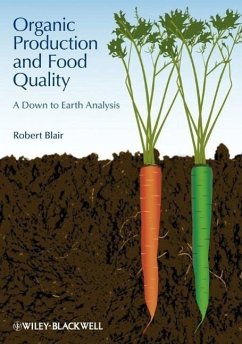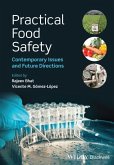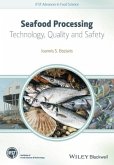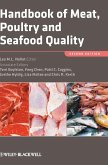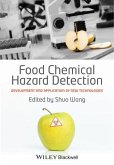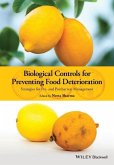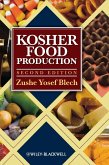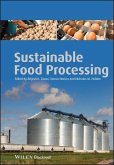"Effects of Organic Production on Food Quality" is the first comprehensive book on how organic production methods influence the safety and quality of foods, based on an unbiased assessment of the scientific findings. The book addresses issues that the food industry and consumers raise about organic food in relation to conventional food and assesses the relevant scientific findings in the international literature and the results of food monitoring programs in North America, Europe, Australia and New Zealand. Documented findings related to the nutritional quality, safety and "healthfulness" of organic food are assessed, as well as findings related to the motivation of consumers to buy organic food. In "Effects of Organic Production on Food Quality," the food industry, researchers and academics will find an authoritative and up-to-date source of unbiased information detailing how organic production affects food quality. Examination of this research will allow the concerns of consumers to be adequately addressed, relevant marketing programs established and appropriate information disseminated.
The internet is rife with biased and unsubstantiated claims from the organic industry, and the treatment of issues such as food safety and quality by the media ("if it bleeds, it leads") tends to have a negative impact on consumer perceptions about conventional food. Until recently, more and more consumers in many countries were opting to buy organic food over conventional food, resulting in a radical shift in food retailing. This was due to concerns over chemical residues, food poisoning resulting in recalls, food scares such as "mad-cow" disease, issues like gene-modified (GM foods), antibiotics, hormones, cloning and concerns over the way plants and animals are being grown commercially as food sources. As a result there has been an expansion of the organic industry and the supply of organic foods at farmers' markets, supermarkets and specialty stores.
Effects of Organic Production on Food Quality is the first comprehensive book on how organic production methods influence the safety and quality of foods, based on an unbiased assessment of the latest scientific findings. The title is a 'must-have' for everyone working within the food industry.
Comprehensive explanation of organic production methods and effects on the safety and quality of foods
Authoritative, unbiased and up-to-date examination of relevant global scientific research
Answers the questions of whether organic food is more nutritious and/or more healthy
Hinweis: Dieser Artikel kann nur an eine deutsche Lieferadresse ausgeliefert werden.
The internet is rife with biased and unsubstantiated claims from the organic industry, and the treatment of issues such as food safety and quality by the media ("if it bleeds, it leads") tends to have a negative impact on consumer perceptions about conventional food. Until recently, more and more consumers in many countries were opting to buy organic food over conventional food, resulting in a radical shift in food retailing. This was due to concerns over chemical residues, food poisoning resulting in recalls, food scares such as "mad-cow" disease, issues like gene-modified (GM foods), antibiotics, hormones, cloning and concerns over the way plants and animals are being grown commercially as food sources. As a result there has been an expansion of the organic industry and the supply of organic foods at farmers' markets, supermarkets and specialty stores.
Effects of Organic Production on Food Quality is the first comprehensive book on how organic production methods influence the safety and quality of foods, based on an unbiased assessment of the latest scientific findings. The title is a 'must-have' for everyone working within the food industry.
Comprehensive explanation of organic production methods and effects on the safety and quality of foods
Authoritative, unbiased and up-to-date examination of relevant global scientific research
Answers the questions of whether organic food is more nutritious and/or more healthy
Hinweis: Dieser Artikel kann nur an eine deutsche Lieferadresse ausgeliefert werden.
"This comprehensive book is welcome in that it not only covers the quality of crops in separate chapters on vegetables, fruit and cereal grains but it also deals, in equal measure, with the quality of meat, milk products and eggs." (The Biologist, March 2014)
"Everyone with a serious interest in the differences between organic and conventional food should have this book on their coffee table or bookshelf, because it is the most comprehensive and objective library of present evidence." (Int. J. Environment & Pollution, 1 May 2013)
"Summing Up: Recommended. Upper-division undergraduates through professionals; general readers." (Choice, 1 December 2012)
"This book by Professor Blair is a very valuable analysis of how organic food production affects food quality, and the conclusions and suggestions should be of great interest to all sectors of the food industry, including researchers and producers. Hopefully the book will also benefit consumers by encouraging the media and the food industry to present a more accurate picture of the relative quality of conventional and organic foods." (Asian-Australasian Journal of Animal Science, 1 May 2012)
"This is a remarkable book . . . Everyone with a serious interest in the differences between organic and conventional food should have this book on their coffee table or bookshelf because it is the most comprehensive and objective library of present evidence." (Prof. John Hodges, Food and Nutrition Sciences)
"Dr. Blair's book is a comprehensive and balanced review of the scientific literature related to the organic versus conventional debate. . . . Each chapter provides an unbiased overview of the literature related to a particular food item and lets the reader decide if their preference for or against a particular organic food is supported by research." (Journal of Applied Poultry Research, 1 December 2012)
"This unique book gives an objective and thorough view of a major issue in health, nutrition, food quality, the environment and food production systems and is of interest to consumers, farmers, nutritionists, medical specialists, environmentalists and businesses in the food chain." (Journal of Tropical Agricultural Association, Winter 2012)
"Everyone with a serious interest in the differences between organic and conventional food should have this book on their coffee table or bookshelf, because it is the most comprehensive and objective library of present evidence." (Int. J. Environment & Pollution, 1 May 2013)
"Summing Up: Recommended. Upper-division undergraduates through professionals; general readers." (Choice, 1 December 2012)
"This book by Professor Blair is a very valuable analysis of how organic food production affects food quality, and the conclusions and suggestions should be of great interest to all sectors of the food industry, including researchers and producers. Hopefully the book will also benefit consumers by encouraging the media and the food industry to present a more accurate picture of the relative quality of conventional and organic foods." (Asian-Australasian Journal of Animal Science, 1 May 2012)
"This is a remarkable book . . . Everyone with a serious interest in the differences between organic and conventional food should have this book on their coffee table or bookshelf because it is the most comprehensive and objective library of present evidence." (Prof. John Hodges, Food and Nutrition Sciences)
"Dr. Blair's book is a comprehensive and balanced review of the scientific literature related to the organic versus conventional debate. . . . Each chapter provides an unbiased overview of the literature related to a particular food item and lets the reader decide if their preference for or against a particular organic food is supported by research." (Journal of Applied Poultry Research, 1 December 2012)
"This unique book gives an objective and thorough view of a major issue in health, nutrition, food quality, the environment and food production systems and is of interest to consumers, farmers, nutritionists, medical specialists, environmentalists and businesses in the food chain." (Journal of Tropical Agricultural Association, Winter 2012)

